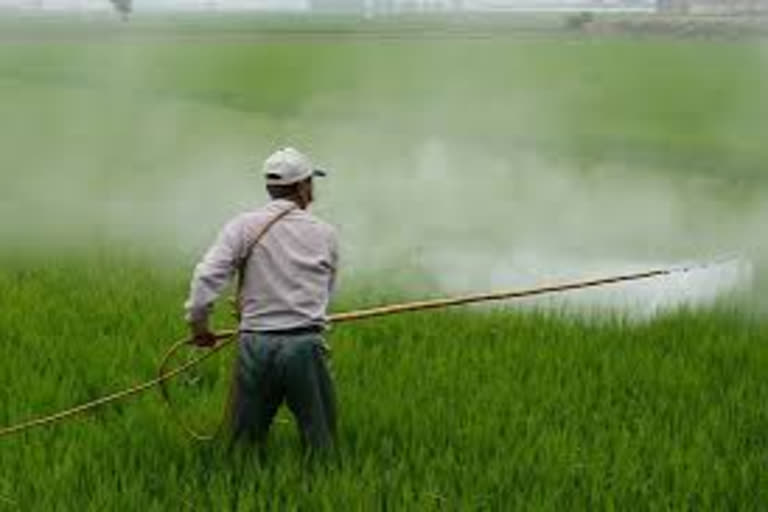Srinagar (Jammu and Kashmir): Orchard growers in Kashmir claim that their crops are under threat from spurious pesticides available in the local markets. The government agrees it is a matter of concern but points out that they are helpless due to a lack of testing laboratories in the Union Territory. The economic survey report of 2018-19 notes that the consumption of pesticides has increased manifold. Horticulture and agriculture involve more that one million people directly or indirectly in Jammu and Kashmir; where 3.5 lakh hectares of land is used to cultivate under various crops.
Mohammad Syed, a resident of Kashmir's Anantnag district, who has been an orchard grower all his life says, "We spray fertilizers as per the schedule recommended by the Sher-e-Kashmir University of Agricultural Sciences and Technology of Kashmir (SKUAST-K) but the harvest is neither as expected nor as per the standard. The pesticides available in the market doesn't serve any purpose. We have to spray repeatedly in large amounts to get some results though not satisfactorily. Also, both the times, money and resources get wasted."
"I fail to understand why the government is not taking some concrete steps to stop this menace. The action should be taken against the government employees, dealers who have also been misleading us. It's high time for the enforcement teams to act," he adds.
Echoing similar views, another orchard grower from Shopian, Sikander Khan says, "After the central government abrogated Article 370 and 35A of the Indian Constitution, the farmers and the growers of Kashmir suffered huge losses due to preventive restrictions imposed in the area. We were not able to transport our harvest to anywhere. This year we were hopeful that the losses will be to an extent compensated but that is not happening due to the fake and bad quality pesticides available in the markets."
Also read: Himachal Pradesh: Farmers fear loss of income as govt plans to ban 27 pesticides
He said, "The spurious pesticides are directly affecting our product. The quality of our harvest right now is not worth exporting to even national markets not to talk about international trade. Interestingly, the prices of these pesticides are skyrocketing and as such we have to take huge loans for our orchards and still, the result is disappointing."
However, authorities claim that they are religiously following all Standard Operating Procedures and educating growers regarding the schedule and bad effects of indiscriminate use of pesticides from time to time.
"We stand with farmers and growers and regularly issue calendars to educate them regarding developments but due to environmental factors, a lot of things change all of sudden and that is beyond our control. Pesticides are available in the market and they (growers) should use them judiciously and as per the recommendation," Javed Ahmed Bhat, Deputy Director Horticulture Officer.
Also read: EU wants to reduce pesticides use, promotes organic farming
When asked about the spurious and fake pesticides available in the local markets and why the action hasn't been taken so far against those selling them, Bhat said, "We have been closely monitoring markets through our enforcement wing and have penalised dealers selling spurious pesticides in the past. The actual problem which we are facing right now is the lack of pesticide testing facilities in Kashmir. Around 60 per cent of samples are sent outside Jammu and Kashmir for tests while only 40 per cent are tested here in the Lal Mandi laboratory. If we had some dedicated facilities here we could recommend good pesticides to growers well in time."
"Horticulture season in Kashmir starts in March, we collect samples and send them for testing to laboratories outside the Union territory. The results get delayed due to overburden in the national laboratories. Meanwhile, farmers had already sprayed spurious pesticides which is beyond anyone's control right now as they have to follow the schedule for every activity for best results, he says, adding, "the cool and dry climate of Kashmir is suitable for exotic fruits like strawberries, apples, pears, cherries, plums, grapes, mulberries, peaches, apricots, walnuts, and almonds, which require moderate rainfall and bright sunshine. But problems of duplicate pesticides and fertilizers are posing a danger to the production of these fruits."


